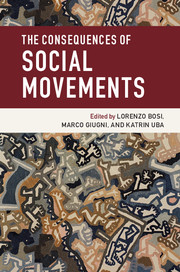Book contents
- Frontmatter
- Contents
- List of figures
- List of tables
- List of contributors
- Introduction
- Part I People
- 2 All is not lost: the 1984–85 British miners’ strike and mobilization after defeat
- 3 Personal effects from far-right activism
- 4 The biographical impact of participation in social movement activities: beyond highly committed New Left activism
- 5 Examining the intergenerational outcomes of social movements: the case of feminist activists and their children
- 6 Aggregate-level biographical outcomes for gay and lesbian movements
- Part II Policies
- Part III Institutions
- Conclusion
- Index
- References
5 - Examining the intergenerational outcomes of social movements: the case of feminist activists and their children
from Part I - People
Published online by Cambridge University Press: 05 January 2016
- Frontmatter
- Contents
- List of figures
- List of tables
- List of contributors
- Introduction
- Part I People
- 2 All is not lost: the 1984–85 British miners’ strike and mobilization after defeat
- 3 Personal effects from far-right activism
- 4 The biographical impact of participation in social movement activities: beyond highly committed New Left activism
- 5 Examining the intergenerational outcomes of social movements: the case of feminist activists and their children
- 6 Aggregate-level biographical outcomes for gay and lesbian movements
- Part II Policies
- Part III Institutions
- Conclusion
- Index
- References
Summary
Introduction
Research on the outcomes of social movements has tended to focus on institutional and political impacts as opposed to individual impacts. Indeed, scholars have generally emphasized the intended consequences of protest activities while leaving the unintended effects, such as biographical consequences, relatively unexamined. However, despite this general trend, several studies conducted since the 1970s have dealt with the impact of activism on the life-course of those who participated in social movements (for a review, see Fillieule 2009; Giugni 2004; Leclercq and Pagis 2011; McAdam 1989, 1999). These studies are characterized by the consistency of their findings, which all point to a “powerful and enduring impact of participation in movement activities on the biographies of participants” (Giugni 2004: 494). Using different methods, the studies show the existence of long-term effects of activism not only on the core participants (McAdam 1988; Whalen & Flacks 1989) but also on the less strongly committed participants (Sherkat & Blocker 1997; Wilhem 1998). More precisely, they demonstrate that three aspects of activists’ lives are durably affected by contentious activities: political participation, professional career, and family life. Concerning the last area, various studies highlight that former activists are more likely than their age peers to have married late in life, divorced, or remained single. Yet despite these findings – which are an incentive to investigate the personal and family spheres of former activists – the issue of activists’ children is mostly absent in the majority of studies, or else limited to indicators such as child-bearing rates. Only a few studies have gone further in an analysis of activists’ family lives and showed that the education of the activists’ children could constitute a way by which former activists could keep working for social change (Whittier 1995). However, the question of the effects on children is generally not tackled. The same can be said about research on political socialization. Although intergenerational transmission within the family lies at the core of investigations on political socialization (Abendschön 2013; Jennings 2007; Jennings et al. 2009), few inquiries have been dedicated to the specific question of the influence of political commitment on activists’ children. Thus, we observe that on the whole, intergenerational transmission within the activists’ families remains an understudied issue in the field of political socialization as well as in research on the biographical consequences of activism.
- Type
- Chapter
- Information
- The Consequences of Social Movements , pp. 106 - 129Publisher: Cambridge University PressPrint publication year: 2016
References
- 8
- Cited by



